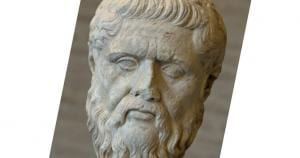From Richard Dawkins’ Twitter feed:
Surprised by common reverence for Plato. Alexandrians like Eratosthenes made superb progress. But what did Plato say that was actually right? And didn’t he mislead generations of theologians & philosophers into thinking you could find truth by making stuff up in an armchair?
 I am not surprised by the common respect for Plato, philosophers do not revere philosophers, because Plato introduced most of the great questions of philosophy and proposed several solutions that remain viable for theist and atheist philosophers alike. I am surprised that Richard Dawkins knows so little about the history of science.
I am not surprised by the common respect for Plato, philosophers do not revere philosophers, because Plato introduced most of the great questions of philosophy and proposed several solutions that remain viable for theist and atheist philosophers alike. I am surprised that Richard Dawkins knows so little about the history of science.
One could treat this Tweet with the disdain it deserves: Plato did not literally think you could find truth by “making stuff up” in an armchair, armchairs not yet existing and “making up stuff” (fantasy) being the subject of withering criticism in Republic. (See the low view of “fantasy” in 509d ff)
More seriously, Dawkins is accusing Plato of opposing science and experimentation and leading others to do the same. Since the methods to which Dawkins alludes had not been discovered yet, Plato surely could not have opposed them! As his one great work of scientific hypothesis (Timaeus) demonstrates, Plato did not oppose observations of the natural world. He used those observations to develop his ideas and make his “theory” more likely. Plato did not think “stories” about the natural world could be more than likely and in this he anticipates certain forms of modern philosophy of science in the tentative nature of scientific explanation and the need for better “stories” as different data was accumulated.
To quote the astronomer Timaeus on the limits of his theorizing:
. . . we prove unable to give accounts that are always in all respects self-consistent and perfectly exact, be not thou surprised; rather we should be content if we can furnish accounts that are inferior to none in likelihood, remembering that both I who speak and you who judge are but human creatures, so that it becomes us to accept the likely account of these matters and forbear to search beyond it.
Throughout the dialog, Timaeus offers provisional answers based on his observations and speculations, recognizing that better ideas might come, but these must be likely and not merely ideal speculation. The Platonist approach, like modern physics, prioritizes mathematics without ignoring experimentation.
Dawkins, I suspect, has the outdated view that the Hellenistic and Roman Neoplatonist were anti-science. Here is a review of just one recent book that explodes this ahistorical myth.
Plato did inspire key aspects of the scientific revolution, Kepler being just one notable example. Plato in Timaeus and his discussions of cosmology gave mathematics an elevated role. Numeracy, geometry, and what we would call mathematical modeling were necessary disciplines for Plato and those who agreed with his approach. Observation and fitting those observations to the most elegant mathematical models pushed science and mathematics forward. Platonism was a deep influence on Leibniz, to cite just one great mathematician and thinker. Note as well that in the Western world, Timaeus, the great Platonic treatise on the cosmos and biology, was the main Plato to be had. As a result, Plato the cosmologist was the Plato of the late Middle Ages.
And Eratosthenes was deeply influenced by Platonism, but perhaps enough is enough in piling on poor Professor Dawkins.
Dawkins is not so much wrong as blissfully ignorant of history, philosophy of science, history of science, and the history of mathematics. This makes opining easy! Plato gives hope to such a sophist, some latter day Thrasymachus, but only if he will let his error go.
——————————————-
See my When Athens Met Jerusalem for an introduction Plato.












